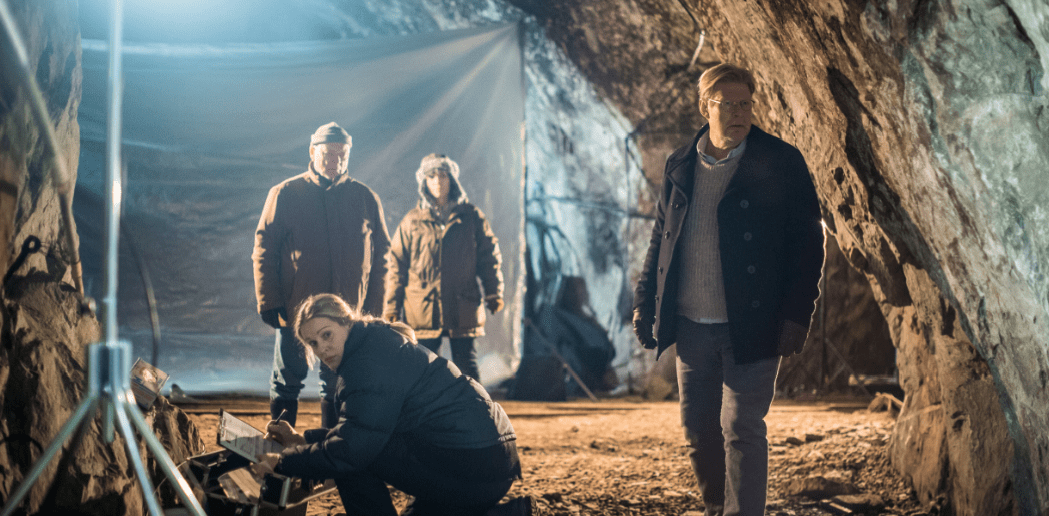Hjorth, executive producer, script writer and co-founder of Swedish production house Tre Vanner, started the company in 1994 “to get things made the way we wanted them to be made”. The company produces feature films (including Easy Money 1 and 2, with Easy Money 3 to be released this August), and TV series like The Fjallbacka Murders. He also recently became a best-selling author (with Hans Rosenfeldt) through the Sebastian Bergman books, which only came about due to unexpected delays in the making of the TV series of the same name (pictured above).
“The back story to Bergman is that we wanted to create a new character, and in the middle of that process, Millenium became a huge phenomenon, which created a significant demand for crime books,” he says. “So we wrote the first one and now we’re on the third volume, and they are currently at 2, 9 and 10 in the German best-sellers list. More than anything though, the success of the books and now the TV series prove to me that quality story telling is the key to all content, with form a secondary consideration. That said, we’ve always seen Bergman as a TV series, and we won’t be making a film because the story arcs are just too long.”
Quite apart from its justifiably stellar reputation for producing great writers such as Henning Menkel, Hakan Nesser and Karin Alvtegen, Sweden is also a microcosm for the way in which the film and TV industries of the US, UK and France are now heading: “Sweden being a country of only nine million people, actors and crew have always had to work in both TV and film to make a living; something that the global content industry is now facing,” he observes. “And on top of that, when I see how the numbers of people going to cinemas is falling despite this year’s crop of summer blockbusters, I really feel that TV is the place to be. The traditional film eco-system is very challenged right now.”
And it is not, he believes, the only traditional system that is under threat: “Netflix launched in Sweden last October, and they just announced that they already have 642,000 subscribers. Even taking into account that Swedes are by nature early adopters, if you consider that number as a percentage of the total population, it’s an incredible market share to have captured in just eight months,” he says. “But more significantly, what is it saying is that the audience wants control, that people are absolutely ready for that kind of offer. But of course what it means to the TV industry is significant disruption, and in the short term, my feeling is that the industry will react, which it absolutely must do, because nothing as significant as this happens without a counter-reaction. But one result will very probably be that nervousness in the TV industry will make financing new productions more complicated in the short to medium term, which again brings us back to the fact that it all comes down to having the right content.”
Scandinavian series these days are nearly always made through co-productions, an area that Hjorth sees as central to the long term health of both Tre Vanner and broader regional industry: “This blurring of traditional lines across the content production and distribution industry is providing opportunities for us, because co-productions coming from what I call the Northern European Euro Pudding, by which I mean producers and public broadcasters from Germany, Scandinavia and Benelux, have been a staple for us for many years. And now suddenly French and British companies are wanting to get involved, because we have a financing model that works, and more to the point, we produce a lot of series and films that work. Up until a couple of years ago, I couldn’t get appointments in the UK, but since The Bridge, The Condemned and more, we are taken much more seriously.”
Europe is, says Hjorth, underrated as a talent pool: “Europe has a lot of the very best cinematic and TV talent, but the problem is the system pushes a lot of that talent into art-house cinema, which is inherently limited in terms of appeal. But we have found that if you take a classic genre such as horror or crime, then add a European twist, you end up with something that travels surprisingly well. Easy Money director Daniel Espinosa, who last year worked with Denzel Washington on Safe House, is a classic example of that hidden talent. Before he made Easy Money 1 he was filming the pilot of a Tre Vanner TV series, now he’s a Hollywood regular.”
Gary Smith is senior reporter for the MIPCOM News. Film will be a key focal point of MIPCOM 2013. Between now and then, MIPBlog will present a series of posts exploring the ever-growing bridges between TV and cinema. Enjoy!




